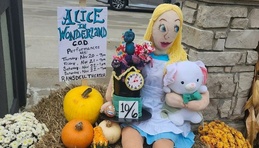No Bowl of Cherries
Nov. 1, 2006
This is so weird. One of Northern Michigan’s environmental bad boys produces mara-schino cherries for Cherry Garcia ice cream. It’s produced by Ben & Jerry‘s, which strongly promotes social and environmental responsibility.If you’re eating the wondrous ice cream confection tonight, take time to think about Williamsburg Receiving and Storage (WRS) and how it dumped cherry pits into wetlands and spewed wastewater into a meadow and gigantically stunk up an entire neighborhood.
WRS has been a bane to its neighbors for the last six years. Some claim that fumes from the cherry processing have burned their eyes and throats and made them throw up.
Of course, there’s always another side to the story. Chris Hubbell, who owns WRS and its sister company Cherry Blossom, invested tens of thousands in reverse osmosis equipment to fix the wastewater mess. Unfortunately, the two-year experimental project with General Electric failed, and the money went into a sinkhole, along with hundreds of thousands of dollars spent on lawyers and consultants.
“I think he’s a guy who has always wanted to do the right thing, but entrusted probably the wrong people,” said Joe Quandt, a lawyer with
an expertise in biology who is trying to help
him do better.
Hubbell is so financially strapped that rumors abound how much longer Cherry Blossom can remain in business. Yet the neighborhood smells better. There’s just a mild odor—like dirty socks—that sometimes drifts about.
Last winter, Hubbell met with a committee to clean up his company‘s act, and he followed through on most of his promises—under pressure of a lawsuit.
By all accounts, Hubbell is tired of his neighbors’ criticism and is convinced they have exaggerated their complaints with the intent of wiping his agribusiness complex right off the Williamsburg map.
A variety of lawsuits erupted this past year, and in November all those involved will sit down in a mediation—Chris Hubbell, the neighbors, and the state Department of Environmental Quality—and, of course, the lawyers.
But now there’s another player in this story, and it’s Sensient Technologies, a huge, multi-national company, which is legally intertwined with WRS. One day, a retired lunch lady named Nola Boals decided to call Sensient and that’s when things got hot.
WON‘T SHUT UP
Of all the neighbors, Robbin Bustance and Nola Boals, are the mouthiest. Sandy Kinnee considers herself the quieter of the three, but she’s the one with the stink meter in her yard.
Boals was the first to confront Hubbell. When this all started, she walked into the middle of the road and videotaped the plant that sits across the street from her house. Hubbell demanded she leave, saying she was trespassing. She told him, “Bunk! You‘re going to have to call the police because I‘m not moving.“ And she didn‘t.
In that first year, Bustance thought Boals was simply being a pain in the neighborhood and ignored her phone calls. Bustance, a hair stylist and boxing coach, knew that cherry processing wasn’t always pretty and thought her own calls to Hubbell would fix things right up.
Bustance grew up on an orchard, shaking cherry trees when she was 11 years old. Her family sold the farm to Chris Hubbells’ parents when she was 15 years old, so she worked for a different cherry farm, driving a tractor and pulling out older cherry trees. That farm, too, was sold to the Hubbells.
Robbin was a good kid, but sometimes smarted-off at school. Boals, the lunch lady then, gave her time on “the wall.” Bustance remembers Boals as a little scary. Boals had her own challenges. She had a handicapped daughter, Kim, with cerebral palsy and a quadriplegic, who died at the age of 17. Chris Hubbell’s mom worked with Kim at the house, trying to retrain her brain with “patterning.“ Said Nola Boals: “The only word I ever heard her say was Bradley,” the name of her older brother.
Bradley Boals, a lumberjack of a man, lives with his mom. He has stayed in the neighborhood, in large part because of the wildlife abounding in the wide-ranging Petobego Marsh. Common sense would suggest the wetland area would be the last place to locate an industrial site, he said.
ROOTS OF THE PROBLEM
Bradley Boals said the commercial site at Munro and Angell roads was originally used to receive cherries and caused no problems.
Local farmers delivered their fruit in a bath of water to avoid bruising.
They were then pitted, graded, sorted and sold. Glenn LaCross, the owner, needed a place to discharge the rinse water and Brad Boals agreed to let him use a culvert that flowed onto the property he owned next door.
Things changed in the late 1980s when LaCross moved on to Leelanau Fruit in Suttons Bay. Gray & Company took over the site. Its new manager was Chris Hubbell. He ran the operation and also set up Hubbell Trucking.
Early on, he told people about the Right to Farm Act, and how it gave him more latitude when it came to his operations. Hubbell later learned that the law protects farms from nuisance complaints, not from environmental laws. And he wasn’t running a farm—he was operating a fruit processing plant.
Problems soon cropped up between Brad Boals and Hubbell about use of the culvert. Hubbell told Boals that he didn‘t need the culvert and wouldn‘t pay him the $400 fee he asked for, yet Boals kept seeing wastewater flow out. It all came to a head when Boals blocked the culvert with a fat log. Two lawsuits later, they got things worked out and the culvert is gone.
Meanwhile, Brad Boals heard that LaCross was still working with Univeral Flavors, and, in fact, helped develop Cherry Garcia ice cream. He supplied the cherries to United Flavors, which “finished” them into maraschino cherries in St. Louis, Missouri.
But in the late 1990s, Universal Flavors was having wastewater problems and began talking to LaCross about doing the finishing process in Suttons Bay. But he lacked access to a municipal wastewater system and didn’t get the job. It was about this time that the company changed its name to Sensient and the new leadership decided to go with WRS.
Suddenly LaCross was out, Hubbell was in.
Hubbell needed money for expanding his facility and went to Grand Traverse County’s Economic Development Corporation (EDC) board for a big loan.
The county Board of Commissioners ama-zingly approved an EDC loan in the amount of $282,500 in December of 1999. Amazing because of Hubbell’s troubling financial history, including tax liens of more than $80,000. The county asked for a full financial disclosure, and was comfortable making the loan since a bank was also involved, said Jean Derenzy, the county’s EDC and brownfield director.
Soon enough the county would have collection problems of its own.
DEAD DEER SMELL
Fast forward to 2000. The neighborhood starts to stink. Nola Boals is mad. And her son is mad too. The stink is making life miserable.
Turns out the odor came from the wastewater from making maraschino cherries.
Hubbell added the finishing operation in 1999 and, unknowingly, waded into trouble with the more complex chemistry. The sweet cherries go into a brine pit, a salt solution that includes sodium bisulfite, which leaches out the cherries’ color, sugar and flavor. The little yellow balls are then flumed into the plant with hoses, and soaked in a vat of water to soak out the chlorides, and then they’re soaked again in red dye, sugar, and flavoring.
The process leaves behind thousands of gallons of wastewater—complete with sodium, chloride, sulfites, sulfates, sugar, and phosphorous.
Hauling was an expensive proposition for the cash-strapped company, so Hubbell began pumping the water into a lagoon and brine pits.
The pits stunk. The bacteria depleted all the oxygen, and the water turned rank. The lagoon off-gassed hydrogen sulfide and sulfur dioxide.
“Every time I took my dog out to go potty, I had to stuff my nose underneath my shirt. The smell is so gross, you feel like you’re going to throw up,” Kinnee said. “There are four or five different smells.
“One smells like a hair permanent, like 10 giant women are getting perms all at the same time. The other is sulfur, like 100 matches getting lit. Then there’s the dead carcass smell and a burnt wood smell.”
Kinnee remembers last Easter when everybody went outside for a walk after dinner. Her grandsons searched the woods for golf balls while her daughter took pictures. Suddenly, bam! the odor hit. Her daughter sped into the house: “I almost threw up! How in the heck do you do it! Why do you stay here!”
Kinnee’s husband gets in the car and drives seven miles to take his daily walk.
Nola Boals’ late husband stopped walking altogether, and she wonders if his sedentary life contributed to the stroke that killed him in March.
In 2001, Bustance went to move her sprinkler and was smacked in the face with the smell of a rotting animal. She ran back inside, took a big bath towel, wrapped it around her face and went back out again. After that, Bustance began returning Boals’ calls. She picked up the phone herself.
“I tried calling anyone I thought who could give me an answer of when I was going to get my life back, when the odor was going to go away. I called the DEQ, Jason Allen, and Howard Walker. They all told me they were doing the best they can.”
FRUSTRATION WITH THE DEQ
A brief synopsis of 2000 to 2005: The neighbors call the DEQ, the DEQ visits the site and writes stern letters. Very little changes.
The DEQ began issuing “letters of violation” immediately in 2000. The letters said WRS was discharging brine, whole cherries, pulp, and pits, none of which was allowed in its permit. Hubbell received letters for dumping cherry pits in a wetland and burning solid waste. The letters of violation flowed throughout the years, although Quandt pointed out that a letter does not qualify as guilt.
In 2002, the DEQ wrote up a 20-page consent order, a document that it prepares for the worst offenders. It detailed exactly the standards Hubbell needed to comply with. But they were working with a very difficult person.
“Trying to pin him down about where the piping was, what kind of treatment he was using—it was really difficult,” said DEQ’s Mike Stifler, the district supervisor of the water bureau district.
Along with the consent order, the DEQ stung Hubbell with a $50,000 fine. The Record-Eagle was hopeful: “The big stink over the bad odors may be coming to an end. And for the residents of Whitewater Township it can’t—and didn’t—come soon enough.”
That was four years ago.
A big frustration was the DEQ had neither the money nor equipment to measure the air quality. Last summer, the EPA finally took measurements and neighbors were warned of high sulfur dioxide levels. Those initial measurements were suspect. A subsequent test showed that the air was polluted, although not at the very high levels originally thought.
The DEQ’s main problem is that it won’t tell companies how to fix their problems, said Greg Reisig, a board member of Northern Michigan Environmental Action Council who joined forces with Bustance and Boals a year ago.
“The DEQ tells WRS, ‘You have a problem—now you tell us how you’re going to fix it. Inland Seas (Hubbell’s consultant) would write up a proposal, the DEQ would amend it, send it back, Inland Seas would respond, send it back, and it just went on and on.
“The DEQ just kept throwing all this paper at it. But the problem of a company relying on a consultant is that the consultant will tell the company what it wants to hear.”
Stifler said the DEQ can’t and won’t tell a company how to solve its problems—and hasn’t for decades. “We tell them the limits. We will talk to their consultants, we will work with them, but we can’t put our name on a piece of paper that says doing this, this and this is adequate. And that’s because that would tie our hands (if the problem remains),” he said.
But this year, a Traverse City judge did
just that.
NO PARADISE
The odor really hit in 2002 and turned into a year-round nuisance: fall, spring and the dead
of winter. Some call it the worst year, but Bustance said that 2005 really took the cake.
“In July, my daughter went on a run through the orchards, and came back. ‘The lagoon really smells mom.’ We went back and saw a pipe going through on the Paradis property (a large field north of the WRS buildings, formerly owned by the Paradis family).
“You could hear the birds, the nature sounds, and then suddenly, I heard this run of water. The smell was so bad it stopped me in my tracks. I saw a seven-foot geyser shooting out of the ground. I held my breath, sprinted home and grabbed a video camera. It was close to dusk. I ran back, and by then the geyser was down to 18 inches.”
Bustance called the DEQ, which discovered that Hubbell was piping undiluted wastewater heavy with sugar and cherry solids to two unlined pits. A path of dead vegetation showed where the water flowed.
Undiluted wastewater can cause iron and manganese (a neurotoxin) to leach out of the soil and into groundwater, although no wells have tested positive for toxins.
The DEQ ordered Hubbell to stop pumping. Hubbell defended the pumping, saying that the DEQ allowed him to pump to the field. The DEQ countered that he first needed permit approval and the water had to be pretreated.
Hubbell stopped piping into the field, but returned to putting the wastewater in the lagoon—about 500,000 gallons that summer and fall, estimated DEQ’s Janice Heuer, who’s been on the site more than anyone.
Bustance was pissed. She began meeting with the neighbors along with the Elk Lake people who could smell the stench a mile away.They met in the homes of Bustance and the Fox family, and were soon joined by Reisig.
Then in November, all hell broke loose. A storm hit the area, and part of the berm surrounding the five-million gallon lagoon busted loose. Tens of thousands of gallons of wastewater spilled over the edge and drenched the area and wetlands. That‘s when the neighbors seriously organized and hired an attorney.
ON THE OFFENSE
After the lagoon broke, so did people’s patience. Nola Boals got on the phone with Sensient Technologies. She made call after call, and then, bingo, she reached Rick Carney, who seemed genuinely interested.
“I was desperate. I had made up my mind that this (the odor) would not happen this summer. I told this Sensient person, we have this situation and he was very open to me. We talked about everything. He called me back and offered to meet with citizens.”
A little later, Bustance discovered that Traverse City State Bank loaned money to Cherry Blossom for what she believed to be the Paradis property. The deed addressed the issue of pollution, and Bustance decided to make an anonymous phone call to the bank president. She asked him if he was aware that a geyser had spewed industrial waste on the property.
“This had been going on since 2000, and Chris always had 14 reasons why things don’t get fixed, so what do you do? You try to talk to people with relationships with him,” said Bustance.
Bustance also called the Michigan Department of Agriculture to ask if they’d stop and inspect one of Hubbell’s trucks transporting cherries.
She believed the cherries might be contaminated from residual wastewater. The MDA, pretty much an advocate group for farmers, didn’t stop the truck, but did leak the phone call to WRS.
All this came at a time when everyone was trying to make nice in a meeting organized by the Traverse City Chamber of Commerce. Doug Luciani, the president, was trying to help out WRS, which was financially struggling.
He gathered together all the key players, and in January and February, they pounded out goals for Hubbell. At the same time, county consultant Ross Childs offered Hubbell a deal for getting rid of his lagoon wastewater at six cents a gallon. That was a significant help to Hubbell, and this time the county was no fool about money. It asked for upfront payment for the loads. Hubbell began delivering the wastewater—from 10,000 gallons to 36,000 gallons a day. (He now uses a Muskegon plant that offered him a better price.)
Bustance wasn’t thrilled with the chamber meetings. “They were all about, let’s move forward, and not one word allowed about the past or lack of trust.
“Doug Luciani just wanted me to shut the hell up. He was pro cherry farmer, pro jobs. He said the company wanted to double the people they have working there, that it was a real viable business and that Chris Hubbell provides a huge percentage of maraschino cherries in Michigan.”
Some have countered the job argument, saying that nearly all the factory and forklift workers are filled by migrants. (Up to 20 illegal aliens were transported from Cherry Blossom in March of 2000, according to Grand Traverse County sheriff‘s reports). The migrant workers are exposed to very intense odors, but are not exactly in a position to complain. Bottom line, the EDC loan and chamber effort are not supporting the kind of jobs that might have been intended.
Around this time Quandt heard about the women’s phone calls, and he was hot. Robbin Bustance‘s call to the bank came at a time when everyone was working together and Hubbell was following up on his promises, he said.
A COURT FRENZY
Suddenly, the DEQ filed suit against Hubbell in February of 2006, and the chamber meetings abruptly stopped. The Whitewater Residents Association, frustrated with the DEQ‘s slow progress on the new consent decree, asked to be part of the lawsuit. The DEQ fought them on it, but lost in court and were forced to accept them as allies in May.
The neighbors believe that the best outcome of the lawsuit is that Judge Tom Power allowed their expert to do something the DEQ couldn’t do: tell the company exactly how to solve the problem with explict timelines. Hubbell was required to inject lime to raise the lagoon’s
pH, empty the lagoon, and install wet scrubbers to capture odors. (Quandt said the company was going to do all those things anyway).
In August, Hubbell withdrew his lawsuit against Bustance and Boals because he couldn’t prove damages. But if Sensient pulls out of Cherry Blossom, he’ll file again, Quandt said.
Chris Bzdok, the citizens’ attorney, was incensed with the lawsuit, calling it a SLAPP suit that seeks to punish activists.
“This is baloney!” Bzdok said. “Saying that it’s illegal for Nola to call a company and say, ‘Can you please help us with this heinous mess at your operation?’ Tell me exactly how that breaks the law? It’s ridiculous.”
TAKING THE HEAT
Two weeks ago, the citizen’s group received a judge’s go-ahead to include Sensient in their lawsuit against WRS for damages. The case will be heard in February, unless they can successfully mediate a settlement on November 13. (A 33-page consent decree with $150,000 in fines are also on the table.)
Bzdok researched the involvement of Sensient, one of the world’s largest suppliers of flavors, fragrances and colors.
“Our question to the court is, who is really controlling what is going on,” said attorney T.J. Andrews, who works with Bzdok. “Every step of the process is dictated by Sensient, and the court is going to look at that reality. Sensient was very aware from the beginning that this finishing process creates a nuisance, and you can’t just cut yourself off from that fact. There is an argument that could be made that Chris Hubbell, this little guy from Elk Rapids, is a victim, but we don’t know that yet.”
Sensient has an interesting relationship with WRS. It buys the cherries from the farmers. But ownership is conveyed to WRS during the actual processing. That way, Sensient owns the cherries in case things turn south for WRS, and it has no responsibility for the troublesome wastewater.
Sensient is financially entrenched, having signed a mortgage document with WRS in 2003. It transferred its equipment to the site in 2000, and supplies chemicals used for processing.
Quandt said Sensient is strictly a WRS cus-tomer. “There’s little evidence to support their claim. I think they want to upset Chris’s relationship with Sensient in order to apply more leverage so Chris will knuckle under in the lawsuit.”
There is a chance that WRS/Cherry Blossom—facing a slew of vendor lawsuits and a tax lien—might declare bankruptcy, but Quandt said Hubbell is striving to get through this. LaCross believes that if WRS does go out of business, there are local processors like his own company that could pick up the business.
Reisig and the neighbors say they don’t want Hubbell to go bankrupt; they just want him to fix the problem…forever. To its credit, WRS has completely emptied the lagoon and scraped the sludge out.
In the bigger picture, Reisig said this case proves that citizens can make all the difference.
“They hired an attorney, and they stood up for their rights, and they also complained to the DEQ, loud and clear. That’s what stepped everything up.”
Jerry Garcia would agree.
Trending

Seasonal Showtime: 20+ Holiday Shows, Concerts, Ballets, and Plays
Come the holidays, the Prince of the Land of Sweets will again reign supreme. If it’s Christmas time, it’s time … Read More >>
Affordable Menstrual Products Up North
Northwestern Michigan College health science student Zinnia Burks wants to understand the prevalence of “period povert… Read More >>
Off to Wonderland in Manistee
Fresh off the spooky fun of It Was a Dark and Stormy Night, and acting as the bridge between that show from the Manistee Civ… Read More >>


